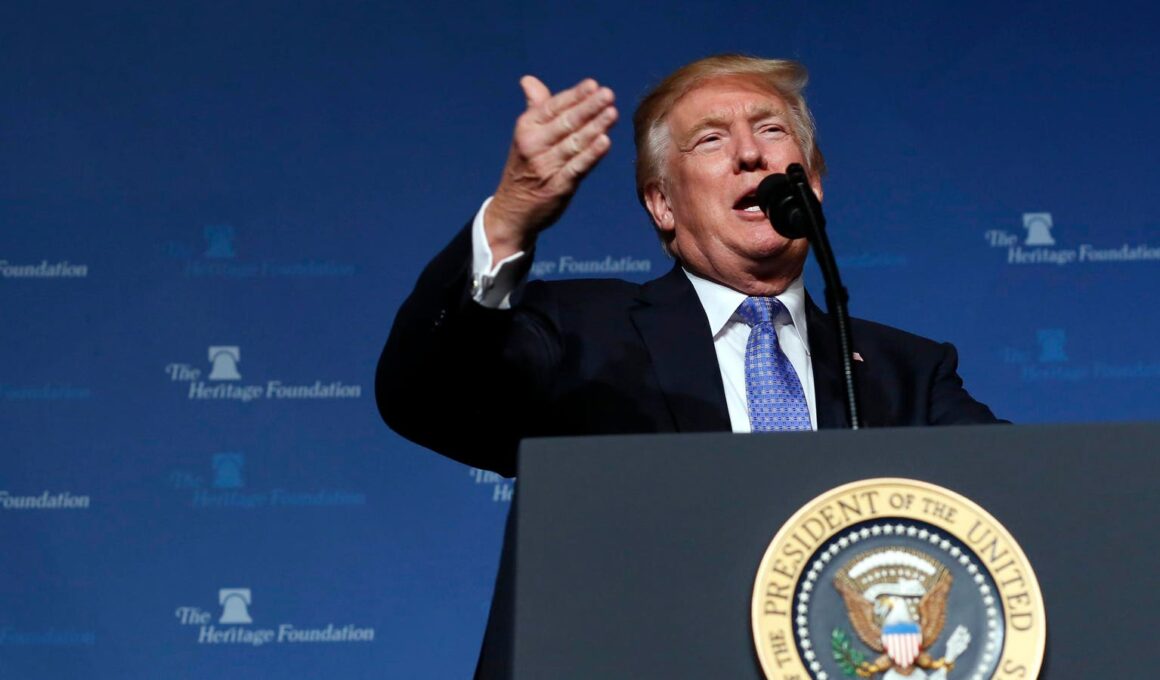Topline
Project 2025 director Paul Dans announced his resignation on Tuesday, as the organization’s wide-ranging blueprint for a potential second Trump term has come under widespread criticism—including by former President Donald Trump and his campaign, even as Trump’s ex-staffers helped to assemble it.
Then-President Donald Trump gives a speech at the Heritage Foundation’s President’s Club Meeting on … [+]
Key Facts
Project 2025, spearheaded by conservative think tank the Heritage Foundation with help from more than 100 other conservative groups, is a multi-part plan for the next conservative administration—namely a Trump presidency—which includes a LinkedIn-style database for presidential personnel hopefuls, training programs for executive branch positions and an as-yet-unreleased “playbook” laying out what Trump should do in his first 180 days.
Though the project is led by the Heritage Foundation and other private third-party groups and is not formally tied to Trump, who has tried to distance himself from the operation, its proposals were developed in part by former members of his administration and other Trump allies, and the ex-president has previously praised Heritage for its policy work.
The project has drawn the most attention for its “Mandate for Leadership,” a 900-page proposed policy agenda that describes itself as a “plan to unite the conservative movement and the American people against elite rule and woke culture warriors,” laying out plans for all aspects of the executive branch.
Personnel: Project 2025 broadly proposes to insert far more political appointees who are ideologically aligned with the president into the executive branch—replacing many of the nonpartisan career civil servants who serve in it now—proposing an executive order that would put political appointees into any “confidential, policy-determining, policymaking, or policy-advocating positions” (which Trump previously did at the end of his presidency, but President Joe Biden then overturned it).
Federal Agencies: It proposes a scaled-down federal government, including the abolishment of multiple agencies—including the Department of Education, Department of Homeland Security, National Oceanic and Atmospheric Administration and Consumer Financial Protection Bureau—whose remaining departments would be folded into other agencies or privatized, including the Transportation Security Administration.
Transgender Rights: Transgender rights and gender identity beyond biological sex are roundly rejected, with such steps as reinstating the ban on transgender Americans serving in the military, prohibiting public school educators from referring to students by anything other than their birth name and pronouns without parental permission, and ensuring no federal funds are used to provide gender-affirming care.
DEI and LGBTQ Rights: Project 2025 seeks to eliminate diversity, equity and inclusion programs from throughout the federal government and in universities, and while it doesn’t outlaw same-sex marriage, it supports “nuclear families” that include a “married mother, father, and their children,” and calls for restricting laws that bar discrimination on the basis of sex to exclude sexual orientation and gender identity.
Climate Change: The proposal would undo much of the federal government’s climate work, including by leaving the Paris Climate Agreement, overhauling the Department of Energy to promote oil and natural gas and deemphasize green energy sources, removing the Department of Agriculture’s focus on sustainability and curtailing climate research.
Abortion: While Project 2025 doesn’t explicitly call for an abortion ban, it would take many steps to restrict the procedure, including directing the Food and Drug Administration to revoke its approval of abortion drug mifepristone, using the Comstock Act to block any abortion equipment or medication from being mailed—which abortion rights advocates have said would be a “backdoor” way to ban abortion—barring federal funds being used to provide healthcare coverage for abortion and requiring states to report all abortions that take place there to the federal government.
Education: Project 2025 emphasizes a “school choice” policy that directs public funds to be used for students to attend private or religious schools, bars “critical race theory” from being taught in federally funded schools and advocates for legislation that would allow parents to sue schools they feel have acted improperly—such as by teaching controversial subjects or requiring students to disclose information about their religious beliefs.
Student Loans: Student loan relief efforts would come to an end—including the public service loan forgiveness program and income-driven repayment plans—as the proposal states “borrowers should be expected to repay their loans.”
Big Tech: TikTok would be banned, and the proposal calls for reforming Section 230—which shields tech companies and social media networks from being sued over content on their platforms—and allowing laws like those passed in Florida and Texas that seek to punish social media companies who ban or suspend users based on their “viewpoints.”
Justice Department: Project 2025 calls for a “top-to-bottom overhaul” of the DOJ and FBI that gets rid of what it calls an “unaccountable bureaucratic managerial class and radical Left ideologues,” proposing an agency that would be more focused on violent crime and filing litigation that’s “consistent with the President’s agenda” and filled with far more political appointees; it also proposes prohibiting the FBI from investigating misinformation or making “politically motivated” moves against U.S. citizens.
Taxes: Project 2025 would seek to get rid of current tax rates and most deductions and credits, instead proposing a 15% rate for anyone under the Social Security wage base ( $168,000 in 2024) and 30% for taxpayers earning more than that—which means the lowest-income taxpayers will now pay more and some higher earners will pay less, and it would also lower the corporate income tax rate to 18%.
Federal Reserve: The project seeks to reform the Federal Reserve by “tak[ing] the monetary steering wheel out of [its] hands and return[ing] it to the people,” which the authors propose could be done by getting rid of the government’s control over the nation’s money entirely—instead leaving it up to banks—or returning to the gold standard, in which the dollar’s value would be tied to a specific weight of gold.
Foreign Relations: Project 2025 emphasizes opposing China, which it describes as “a totalitarian enemy of the United States,” and directs the U.S. to pull out of international organizations when they don’t serve the administration’s interests, including the World Health Organization and various United Nations agencies.
Healthcare: Project 2025 does not seek to overturn the Affordable Care Act, but would make significant cuts to Medicaid and impose work requirements to receive coverage, as well as reform Medicare—including by making Medicare Advantage, a paid supplement to Medicare, the default option for patients.
Get Forbes Breaking News Text Alerts: We’re launching text message alerts so you’ll always know the biggest stories shaping the day’s headlines. Text “Alerts” to (201) 335-0739 or sign up here.
Is Trump Involved With Project 2025?
Trump has denied any connection to Project 2025, claiming on Truth Social last week that he has “nothing to do with them,” has “no idea” who’s behind the plan and finds some of its ideas “absolutely ridiculous and abysmal.” His campaign advisor Chris LaCivita has also denounced it, calling the effort a “pain in the ass.” But many aren’t buying the ex-president’s claims: The team behind Project 2025 includes 140 people who worked for Trump in his administration, according to CNN, including six former Cabinet secretaries and four people he nominated as ambassadors. Trump has also seemingly endorsed Heritage’s policy work in the past, saying at a 2022 dinner for the Heritage Foundation that the group was “going to lay the groundwork and detail plans for exactly what our movement will do … when the American people give us a colossal mandate.”
News Peg
The Heritage Foundation confirmed July 30 that Project 2025 director Dans is stepping down and leaving the organization, saying in a statement he was “moving up to the front where the fight remains.” The Daily Beast reports Dans resigned amid pressure from the Trump campaign, though the Heritage Foundation said only that it had always intended its “policy drafting” work to only last through the party conventions, “and we are sticking to that timeline.” The Heritage Foundation denied reports Project 2025 is shutting down, and said its personnel efforts would continue.
What Impact Could Project 2025’s Policies Have?
Experts have warned Project 2025’s proposals could have seismic impacts on how the federal government operates if carried out. In an article for Justia, criminal defense attorney and former prosecutor John May suggested Project 2025’s language endorsing the executive branch being able to “restrain the excesses” of the judicial branch and Congress means “if the President wants to, the President can defy any decision of the Supreme Court, any legislation by Congress, maybe even the act of impeachment and removal from office.”
Who’s Behind Project 2025?
The main team behind Project 2025 includes Heritage Foundation director Paul Gans and former Trump White House personnel leaders Spencer Chretien (who also served as Trump’s special assistant) and Troup Hemenway, according to the project’s website. Other groups listed as participating in the project include ex-Trump adviser Stephen Miller’s America First Legal, legal group Alliance Defending Freedom, Liberty University, Susan B. Anthony Pro-Life America and Turning Point USA. The 900-page policy agenda was co-authored by a series of conservative figures, with chapters penned by such Trump allies as former Housing Secretary Dr. Ben Carson, former Deputy Homeland Security Secretary Ken Cuccinelli, former HHS Civil Rights Director Roger Severino and former Trump advisor Peter Navarro, who went to prison in March for contempt of Congress.
Will Trump Have To Follow Project 2025’s Plans?
Trump will not be under any obligation to follow Project 2025’s proposals if he wins the presidency, though history suggests he’ll listen to at least some of them. The Heritage Foundation made a similar policy proposal for Trump ahead of his presidency in 2016, and boasted two years into his tenure that Trump had already followed 64% of its recommendations, CBS News notes.
Would Project 2025 Change Social Security?
One area that Project 2025 doesn’t touch on is Social Security benefits and any potential cuts to the program, even as proposals outline changes to numerous other government “entitlements.” Changing Social Security and making cuts to its spending has been a priority for the GOP for decades, though the American public has long opposed slashing benefits. Republicans’ efforts have waned under Trump, however, and the ex-president publicly claimed in March he “will never do anything that will jeopardize or hurt Social Security or Medicare,” after he came under fire for suggesting otherwise in an interview with CNBC.
Surprising Fact
While much of Project 2025’s policy agenda concerns federal agencies, the proposal has also gotten attention for its call to outlaw all pornography, which it claims is tied to “the omnipresent propagation of transgender ideology and sexualization of children” and is not protected under the First Amendment. Project 2025 calls not only for pornography to be made illegal, but also for anyone involved with its production and distribution to be imprisoned, for any librarians or educators who “purvey it” to be registered as sex offenders and for telecommunications and technology firms that facilitate its distribution to be shut down.
Key Background
The Heritage Foundation’s practice of laying out a policy roadmap for a future Republican administration actually dates back to the Reagan era, founder Edwin J. Feulner noted in the afterword of the 2025 edition. The organization first laid out a blueprint in 1981 that President Ronald Reagan ultimately adopted, fulfilling half of its recommendations by the end of his first year in office. The Heritage Foundation has continued to come out with blueprints for potential conservative presidents each election since, it notes, and its 2025 Mandate for Leadership was published in 2023. While it came out last year, Project 2025 gained new attention in the past week since Trump disavowed it—sparking a wave of reports highlighting his ties to the figures behind the project that debunk his claims. Democrats have also used the controversial proposal as a key talking point and argument for why the left should unite behind President Joe Biden and focus on defeating Trump, particularly as Biden’s candidacy has come under widespread scrutiny in the wake of the president’s poor debate performance in June.
Further Reading








